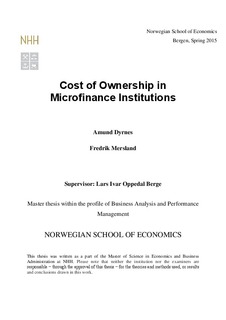Cost of ownership in microfinance institutions
Master thesis
Permanent lenke
http://hdl.handle.net/11250/300260Utgivelsesdato
2015Metadata
Vis full innførselSamlinger
- Master Thesis [4372]
Sammendrag
The purpose of this thesis is to identify the effect of ownership type on costs in microfinance institutions. The study utilize panel data containing information from 403 microfinance institutions in 74 countries. An ordinary least squares (OLS) regression analysis was applied to generate the results. This thesis focuses on how different ownership types, non-profit organizations, shareholder-firms and cooperatives affect operating costs, employee cost and personnel productivity. The main results of the analyses is that there are no significant differences in neither operating costs, employee costs nor personnel productivity between non-profit and shareholder owned microfinance institutions. These results contradict the suggestions from ownership and agency cost theory, which proposes that shareholder owned firms should display lower costs than non-profit firms.
Another result that contradicts the suggestions of ownership and agency theory relates to cooperative microfinance institutions. While theory propose that cooperatives should have lower costs than shareholder owned firms, cooperatives display lower operating costs, employee cost and personnel productivity, but the effect on the latter two fades with the inclusion of control variables. The effect on operating costs is consistent through the different model specifications.
A lack of exogeneity in the explanatory variables limits the confidence in the study’s ability to determine causal effects. The results of the study are therefore of a suggestive rather than conclusive nature. Nevertheless, the study is a new contribution to the debate on ownership costs in microfinance institutions, and can serve as a starting point for further research on the topic. In addition to the academic relevance, the results of the study may have implications for several other stakeholders in the microfinance industry, such as managers, investors and policy makers.
